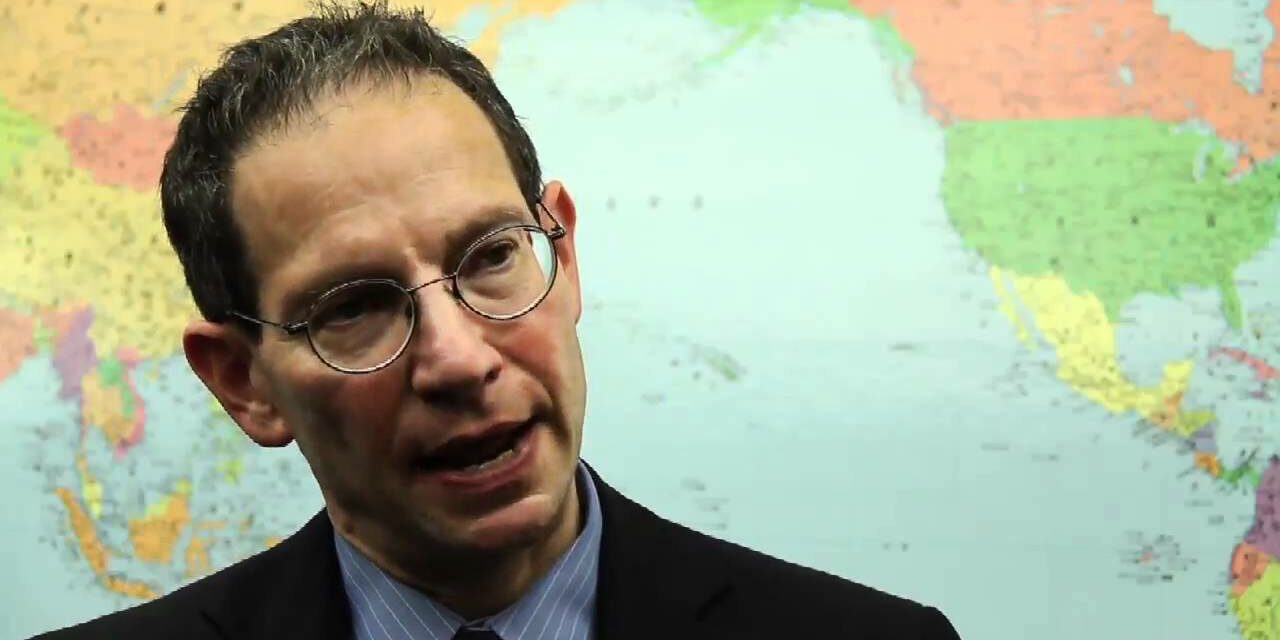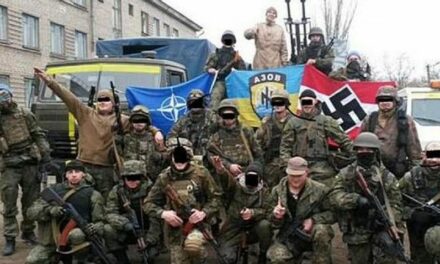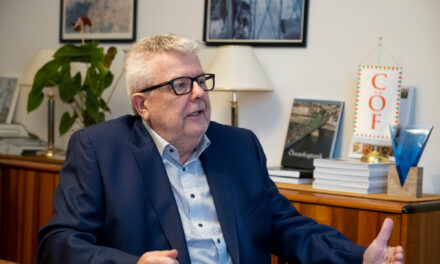The return of a two-bloc world playing by the rules of realpolitik means that the West must stop exporting democracy and return to a strategy of containment aimed at preserving geopolitical stability and avoiding a great power crisis, writes Charles A. Kupchan of Georgetown University Professor at The National Interest.
The superpower competition is back. The transatlantic alliance must therefore review its strategy and reduce its idealistic ambitions in favor of pragmatic realism. During the Ukraine crisis, the ideological North Star of the West – the promotion of democracy – was in charge, and NATO supported and encouraged Kiev's efforts to join the Western alliance. However, Putin did not let that happen.
Russia's war threatens to obscure the sober lessons of the conflict: in order for the world to return to the rules of power politics, strategic reality must prevail over ideology, and the goals of the West must remain in sync with the means of the West.
This means that the West should focus on protecting the democratic community rather than expanding it.
The transatlantic community must now temper its idealistic ambitions with greater strategic pragmatism in order to successfully navigate a world that has just moved toward Hobbesian realism.
The emerging world strengthens transatlantic unity - just as the threat posed by the Soviet Union contributed to NATO's cohesion during the Cold War. However, the political troubles plaguing the West did not go away; Russia's invasion, along with the prospect of a new Cold War, is not enough to cure the United States and Europe of their dysfunctions. In fact, the war in Ukraine has had economic spillovers that could further weaken centrist politics. Accordingly, America and Europe face a double challenge: they must also continue to put their own house in order.
The Ukraine issue has once again exposed the inevitable tensions between lofty ambitions and geopolitical realities. These tensions subsided during the Cold War, when geopolitical expediency guided US strategy. The Yalta Agreement was the final realist compromise that brought much of Eastern Europe under Soviet rule. Roosevelt and Churchill wisely yielded to the principle of pragmatism when they provided the Soviet Union with a buffer zone on its western flank. This kind of strategic restraint paid off handsomely; it contributed to stability during the long decades of the Cold War, buying time for the policy of patient containment that eventually led to the fall of the Berlin Wall and the collapse of the Soviet Union.
When NATO launched the open door policy, Bill Clinton claimed that it would "erase the artificial line that Stalin drew in Europe at the end of World War II." Secretary of State Madeleine Albright affirmed that "NATO is a defense alliance that ... considers no state to be an enemy." The goal of expanding the alliance was to build a "whole and free" Europe, noting that "NATO is not a threat to Russia." As the crisis in Ukraine escalated, Joe Biden insisted that “the United States and NATO are not a threat to Russia. Ukraine is not a threat to Russia. Foreign Secretary Antony Blinken agreed: "NATO itself is a defense alliance... And the idea that Ukraine is a threat to Russia, or for that matter NATO is a threat to Russia, is misguided." America's allies mostly echoed the same sentiment. NATO Secretary General Jens Stoltenberg confirmed before the Russian invasion: "NATO does not pose a threat to Russia."
Russia, however, saw things quite differently – and not without reason.
Geography and geopolitics matter; the great powers, regardless of their ideological leanings, do not like other great powers straying into their vicinity. Russia has understandable and legitimate security concerns about NATO establishing bases across its more than 1,000-mile border with Ukraine. NATO may be a defense alliance, but it has concentrated military power that Russia understandably does not want parked anywhere near its territory.
Indeed, Moscow's protests were, ironically, very much in line with America's approach, which has long sought to keep other great powers away from its own borders. The United States spent much of the nineteenth century driving Britain, France, Russia, and Spain out of the Western Hemisphere. After that, Washington regularly resorted to military intervention to maintain its dominance in the Americas. The exercise of hemispheric hegemony continued during the Cold War, and the United States was determined to oust the Soviet Union and its ideological sympathizers from Latin America.
When Moscow deployed missiles to Cuba in 1962, the US issued an ultimatum that brought the superpowers to the brink of war. After Russia recently hinted that it might re-deploy its military to Latin America, State Department spokesman Ned Price responded:
"If we see any movement in that direction, we will respond quickly and decisively."
Given its own past, Washington should have given more credence to Moscow's objections to Ukraine's accession to NATO. Russian Foreign Minister Sergey Lavrov warned amid the diplomatic waves preceding the Russian invasion:
"It's like a mute talking to a deaf person. It's like we hear each other but don't listen."
NATO enlargement points to the gap between the West's ideological aspirations and geopolitical reality, which has been growing since the 1990s. In the heady decade following the end of the Cold War, the US and its allies were confident that their power had paved the way for the spread of democracy – a goal that NATO expansion would presumably help. But from the beginning, Western foreign policy allowed the principle to mask the geopolitical downsides of NATO enlargement. Yes, NATO membership should be open to any deserving country, and each nation should be able to exercise its sovereign right to choose its membership as it sees fit.
Yet the West was wrong to continue to reject Russia's objections to NATO's ongoing expansion. While the allure of joining the alliance encouraged aspirants to implement the democratic reforms necessary for entry, the open door also led prospective members to engage in excessively risky behavior. In 2008, shortly after NATO ignored Russian objections and promised possible membership to Georgia and Ukraine, Georgian President Mikheil Saakashvili launched an offensive against pro-Russian separatists in South Ossetia, with whom the country had been fighting for years. Russia quickly responded by taking control of two parts of Georgia - South Ossetia and Abkhazia. Saakashvili thought that the West was behind him, but he accounted for himself.
Ukraine did the same. The 2014 Maidan revolution overthrew a pro-Moscow regime and set Ukraine on a Western trajectory, leading to Russian intervention in Crimea and the Donbass. NATO's open door beckoned and in 2019 prompted Ukrainians to enshrine their NATO aspirations in their constitution, a move that once again set off the Kremlin's alarm bells.
Ukraine would have been better off taking the safe route and quietly building a stable democracy while clinging to the neutral status it accepted when it left the Soviet Union.
Indeed, Ukraine's potential return to neutrality figured prominently in the initial talks between Kyiv and Moscow.
NATO wisely avoided direct involvement in the fighting to avoid war with Russia.
But the alliance's reluctance to defend Ukraine militarily has exposed a troubling disconnect between the organization's stated goal of making the country a member and its belief that Ukraine's defense is not worth the cost.
Indeed, the United States and its allies, even as they impose tough sanctions on Russia and send weapons to Ukraine, have revealed that they do not consider the country's defense a vital interest.
But if that is the case, why did NATO members want to extend a security guarantee to Ukraine that would oblige them to go to war to defend it?
In a world rapidly returning to the logic of power politics, in which adversaries can regularly test US commitments, NATO cannot afford to squander such guarantees. Strategic prudence requires distinguishing critical from non-critical interests.
Strategic prudence also requires that the West prepare for a return to sustained, militarized rivalry with Russia. In light of the close partnership between Moscow and Beijing - and China's own geopolitical ambitions - the emerging new Cold War could pit the West against the Sino-Russian bloc stretching from the Western Pacific to Eastern Europe. As in the Cold War, a world of rival blocs can mean economic and geopolitical divisions. The serious impact of the sanctions imposed on Russia highlights the dark side of globalization, the fact that economic interdependence entails significant risks. China may distance itself from global markets and financial systems, while the United States and Europe may choose to expand the pace and scope of efforts to disengage from Chinese investment, technology, and supply chains.
The world may enter a protracted and costly era of de-globalization.
The new strategic conservatism must seek to create a stable balance of power and credible deterrence in Europe and the Asia-Pacific region. But the United States has a scenario for such a world: the one that allowed it to prevail in the first Cold War. But then, a solid and purposeful brand of US strategy rested on solid political foundations and enjoyed bipartisan support.
But the West is politically unhealthy today, the bipartisan pact made behind the power of the United States has collapsed. Ideological moderation and centrism have given way to bitter polarization amid prolonged economic uncertainty and widening inequality. The war in Ukraine did not help matters; Biden's ambitious domestic renewal agenda, already set back by congressional gridlock, was further devalued as Washington focused on the conflict. And high inflation, fueled in part by economic disruptions from the war, is fueling public discontent that is likely to cost Democrats control of Congress after the upcoming midterm elections in November.
In Europe, the economic damage caused by inflation, skyrocketing energy prices and potential energy shortages due to Western sanctions against Russia could lead to the undermining of the continent's unified policy and the weakening of European and transatlantic solidarity.
Americans should not lull themselves into the illusion that a more competitive international environment will automatically restore the country's position and political health - especially in the midst of the highest American inflation rate in the last forty years. Similarly, while Europe has shown impressive unity and resolve during the war in Ukraine, it will undoubtedly face new political challenges as it copes with a massive influx of Ukrainian refugees and additional economic burdens, including disconnection from Russian energy.
Both sides of the Atlantic therefore have hard work to do if they want to put their own house in order, and the Russian invasion of Ukraine signals the return of a more realistic world, which requires that the idealistic ambitions of the West more often yield to cold strategic realities.
Featured image: YouTube













